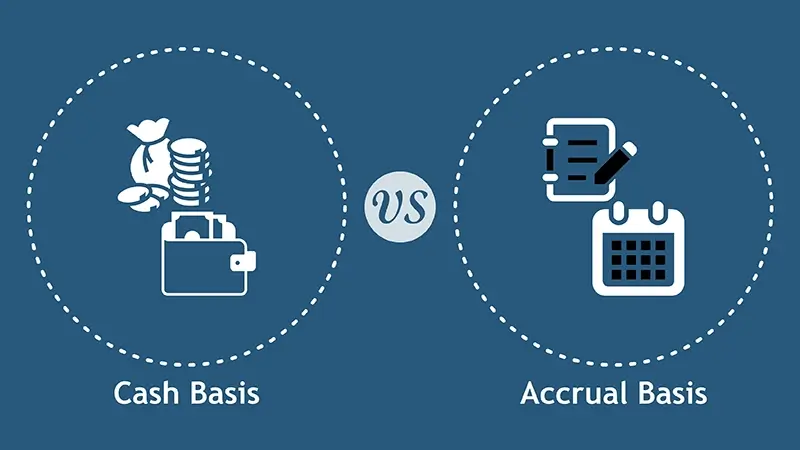Business Tax Accounting Guide
Did you know that accurate business tax accounting can make or break a business? Tax obligations can be a daunting aspect of running a business, but...

To help you choose between these concepts for your business, first understand their definitions and then consult your trusted CPA.
Accrual accounting is a method that records financial transactions based on when they occur, rather than when money is exchanged. This approach provides a more accurate and comprehensive representation of a business's financial health, allowing for better analysis of cash flows, profitability, and overall performance. However, it is important to understand the pros and cons of accrual accounting, as it can be more complex and time-consuming compared to cash-based accounting.
Cash basis accounting is a method of recording financial transactions based on when money is received or paid. Unlike accrual accounting, which recognizes revenue and expenses when they occur, regardless of cash flow, cash basis accounting only recognizes revenue when cash is received and expenses when cash is paid. This approach offers simplicity and ease of understanding, making it suitable for small businesses or individuals with limited accounting knowledge or resources.
So, let's dive in and explore the advantages and disadvantages of both accounting methods, and how to choose the right one for your business.
You might be interested in What Will the FASB's New Disclosure Rules Mean for Your Company? ...
Table of Contents
One of the main advantages of cash basis accounting is its simplicity. It is straightforward to understand, making it suitable for small businesses or individuals with limited accounting knowledge or resources. Cash basis accounting also provides a clear picture of the actual cash flow in and out of a business.
With cash basis accounting, income and expenses are recorded as they are received, eliminating the need to track amounts over longer periods. This straightforward approach may make it unnecessary to hire a professional accountant for your small business if you choose to implement the cash method.
The cash accounting method closely resembles a cash flow statement, offering a clear understanding of the actual cash your business has on hand when it comes to receiving payments and paying bills. If your small business experiences fluctuations in cash throughout the year due to seasonal sales, adopting the cash method of accounting can be advantageous in effectively allocating your resources.
The cash method can be implemented using a simple single-entry system, eliminating the need for a complex accounting program. This makes month-end bank reconciliations easier since you don't have to record accruals. However, it's important to note that single-entry systems also have their drawbacks, which are discussed below.
While the simplicity of the single-entry system required for the cash method can be advantageous, it's important to note that the accrual method requires the use of a double-entry system. This system is based on accounting equations and is designed to provide a standardized and more accurate representation of profit and loss, which can be used for business analysis. Additionally, implementing the accrual method can offer greater control over transaction posting and can help minimize the occurrence of errors.
However, it's important to note that cash basis accounting may not provide a complete picture of long-term profitability. This is because it doesn't account for income that has been invoiced but not yet received, and it also doesn't consider future expenses. For instance, your financial records might show a month as highly profitable, but upon closer examination, you may discover that sales were actually slow and only a few customers paid their outstanding bills. Additionally, paying a large annual expense, such as an insurance premium in one lump sum, can temporarily skew your profit for that month, even though the policy covers the entire year..
As per the IRS, it is important to choose an accounting method that accurately reflects your business's income and expenses for tax purposes. It should be noted that the cash method cannot be used if your business maintains inventory, is a corporation, or has gross receipts exceeding $26 million per year. While these are the general rules, there may be exceptions. If you believe that your business falls into one of these categories, it is advisable to seek guidance from a professional.
Accrual accounting offers several advantages and disadvantages, so it's important to have a clear understanding of both. This knowledge will help you make the most of this accounting method and safeguard your company against any potential issues.
The accrual method allows for strategic planning that incorporates future cash flow. This enables planners to identify points where cash flow may be higher or lower, leading to more accurate cash flow forecasting and strategic planning. By positioning themselves to take advantage of periods of high cash flow and avoid financial crises caused by unexpected cash shortages, company leaders can make the most of their opportunities.
While cash accounting records financial transactions when they actually occur, accrual accounting provides a clearer picture of a company's financial position by representing accounts with all the cash that will be received and paid out. This practice allows top management to understand and plan for upcoming periods based on a more accurate assessment of the business's finances.
Although your business may not be required to use the accrual method to meet GAAP standards, there are several good reasons to consider implementing it. This is especially true if your company is expected to grow to a size where accrual accounting is necessary for GAAP compliance by the SEC. By implementing the system early on and becoming familiar with it, you can reap significant benefits when its use becomes a requirement.
Transitioning to the accrual basis accounting method can present challenges, requiring careful planning and gradual implementation. This process may involve a tiered system of adoption over a period of several years. It is important to note that businesses facing cash flow issues may encounter additional complexities during this transition.
In contrast, cash accounting is relatively straightforward. You simply record income and expenses as they are received or paid. On the other hand, accrual accounting is more intricate. It requires strict adherence to rules and accurate execution of processes to record certain types of income and expenses at the appropriate times. Additionally, navigating tax forms, rules, and procedures can be more challenging when using the accrual accounting method. It is often advisable to consult with a professional accountant in such cases.
If you are managing all of your business's accounting on your own or with a small team, it's important to be aware that the accrual method may increase the risk of internal fraud. To safeguard your company and maintain consistent accuracy in your financial statements, it is essential to establish a system of controls. Additionally, educating yourself on the intricacies of the accrual accounting method and fully understanding the associated risks is crucial. It's worth noting that small businesses in the United States are particularly vulnerable to fraud.
Choosing the right accounting method for your business is a critical decision that influences how you report financial transactions. Two primary methods are cash basis and accrual basis, each with its characteristics.
Business Size and Complexity:
Industry Norms:
Financial Goals:
Tax Implications:
Ultimately, the decision between cash basis and accrual basis accounting depends on the unique nature and goals of your business, as well as any regulatory or industry requirements. It is crucial to carefully assess the advantages and disadvantages of each method in relation to your specific circumstances before making a well-informed decision.
At H&CO, our experienced team of tax professionals understands the complexities of income tax preparation and is dedicated to guiding you through the process. With offices in Miami, Coral Gables, Aventura, Tampa, and Fort Lauderdale, our CPAs are readily available to assist you with all your income tax planning and tax preparation needs. To learn more about our accounting firm services take a look at our individual tax services, business tax services, international tax services, expatriate tax services, SAP Business One, entity management, human capital, and audit and assurance services.

Did you know that accurate business tax accounting can make or break a business? Tax obligations can be a daunting aspect of running a business, but...

H&CO has been named on the Forbes list of America’s Best Tax and Accounting Firms 2023. This prestigious award is presented by Forbes and Statista...
.jpg)
Coral Gables, July 2024 – H&CO is proud to announce that we have been ranked #8 among Accounting Firms in South Florida by Billings and #14 among...